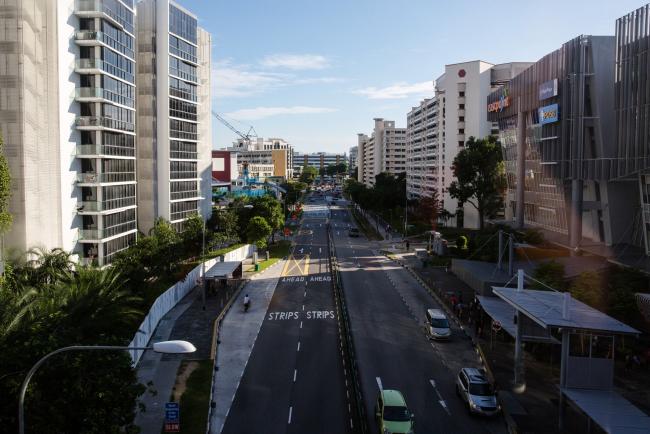(Bloomberg) -- Follow Bloomberg on LINE messenger for all the business news and analysis you need.
Singapore’s property glut is an unintended consequence of government measures to force developers to build and sell apartments quickly or face stiff penalties, according to City Developments Ltd.
The city-state’s second-biggest home builder has come out swinging against a rule that imposes a levy on companies if they don’t complete construction and sell all units within a period of five years from acquiring land.
Chief Executive Officer Sherman Kwek said the timeline should be lengthened to seven or even 10 years “so that it reduces the immense pressure on developers and prevents the current supply glut from worsening.”
Singapore has almost 32,000 either finished or under-construction apartments in the pipeline. It’s a glut market watchers say could take years to clear. Last month, the central bank warned the over-supply also threatens to push down prices.
Far East Organisation Pte declined to comment on the property glut. CapitaLand Ltd. said it will “adopt a disciplined approach in our bids.” “We will monitor market conditions and tailor marketing and sales strategies accordingly,” a spokesperson said in an email.
Kwek said that after the most-recent cooling measures in July 2018, the penalty now stands at a “petrifying rate” of 31.25%, comprised of a 25% penalty compounded at an interest rate of 5% per annum for five years.
Here’s an excerpt of a Q&A with Kwek, edited for length.
How did we get here?
Market sentiment for the residential sector in Singapore was very depressed during the four-year period spanning mid-2013 till mid-2017. This was a result of the initial hike in additional buyers’ stamp duty (ABSD) and the implementation of the total debt servicing framework in 2013, both of which were bitter pills for the market to swallow.
Consequently, developers were also less active during those depressed years and focused mainly on clearing their inventory rather than replenishing land. As a result, by the time market sentiment started to improve in 2017, many developers were running out of land bank and desperately in need of replenishment. What followed was a period of ferocious bidding witnessed at land tenders and en-bloc sales activities.
What happened then?
Land prices reached dizzying heights, placing significant pressure on developers when bidding for land. In turn, these high land prices have subsequently translated into escalating housing prices, with many new launches in the past two years achieving record-breaking prices. This is certainly not desirable to end buyers, and I am sure it poses a significant cause of concern for the government too.
However, when you trace the problem to its source, part of the issue stems from the ABSD timeline. While the intention is to prevent developers from hoarding land, it has created unintended consequences whereby all developers are forced through a narrow funnel to build and sell in a short time frame.
This also prevents developers from timing their launches, even when market sentiment is depressed, as most will have little choice but to launch a new project the moment sales permits are obtained otherwise they may not be left with sufficient time to sell out all the units, especially for bigger projects. Developers end up developing, selling and handing over units within a similar time frame, causing many of them to run out of land around the same time and thus history will likely repeat itself again.
So what’s the solution?
While I understand the rationale behind the ABSD, unfortunately, the fear of running out of the primary raw material -- land -- ultimately outweighs the fear of penalties and this causes developers to bid aggressively for land. This can cause land prices to spiral to unsustainable levels, something which developers also do not want to see happen. To be clear, the five-year ABSD restriction is not the only reason for high land prices but it is certainly a significant contributing factor.
I hope authorities can consider lengthening the ABSD timeline to maybe seven or even 10 years so that it reduces the immense pressure on developers and prevents the current supply glut from worsening (while still ensuring that developers do not hoard land for eternity).
With a longer permissible development and sales period, developers can then stagger their sales launches and ensure a more balanced demand and supply equation. Another way is for authorities to allow the ABSD penalty to be prorated, therefore, if the project still has a few remaining units by the time the deadline swings around, at least the penalty is more bearable.
Has City Developments been caught by the ABSD?
We have been fortunate that none of our projects have ever incurred ABSD, though we have had some close shaves! The penalty is levied on the total land price and is not prorated to the number of remaining units. This penalty is far too hefty and unless the land price is relatively small, I do not believe most developers can stomach such a penalty. We would certainly not consider voluntarily paying the ABSD just to allow for a longer sales runway and would rather put in our full effort into clearing the inventory before the ABSD deadline hits.
How long will it take to absorb the over-supply?
Assuming conservative sales estimates of around 8,000 to 10,000 units per annum, the supply should be fully absorbed in about three to four years.
(Updates to add CapitaLand comment in fifth paragraph.)
